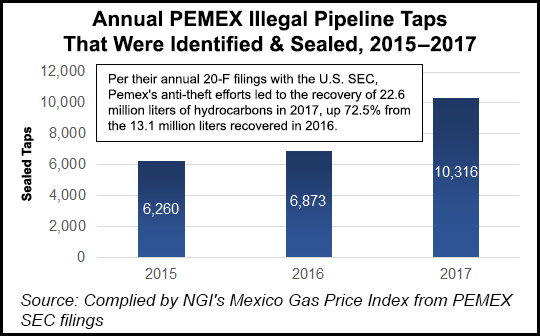Infrastructure | NGI All News Access | NGI The Weekly Gas Market Report
López Obrador’s First Political Crisis Rears Head in Energy Sector
A month into Mexico’s new government under Andrés Manuel López Obrador, security measures to fight rampant fuel theft — part of a larger plan to turn around the fortunes of the country’s oil and gas industry — have caused gasoline shortages in numerous states, angering citizens and signaling the first political crisis of the nascent presidency.

López Obrador said during a Tuesday morning press conference that the country has sufficient fuel to meet demand and supply soon will be normalized as trucks and rail transport make up for closed sections of pipelines where taps have been found.
The states of Hidalgo, Estado de México (which surrounds Mexico City), Jalisco, Michoacán, Guanajuato, Sinaloa, Tabasco and Querétaro have all reportedly seen disruptions, with reports of shortages at gas stations in Mexico City too. Newspaper Reforma said on Tuesday four out of Mexico’s six refineries have seen their operations impacted, while fuel trade group Asociación Mexicana de Empresarios Gasolineros said it could take up to a month for fuel supply in the state of Jalisco to return to normal.
“Huachicoleo,” a colloquial term for fuel theft, has proven disastrous to state oil company Petróleos Mexicanos (Pemex), with lost revenue upwards of $3 billion/year over the last two years. Pemex is the most indebted national oil company in Latin America, with an estimated $105 billion in financial debt.
The president has ordered that the armed forces overlook operations at all six of Pemex’s refineries, as well as 39 storage and distribution terminals, 12 pumping stations, a control center and 15 distribution networks.
López Obrador said during the press conference that the Army had found an illegal tap within the Salamanca refinery in the central state of Guanajuato leading into a secret storage area.
“The problem of fuel theft will continue even when the supply issue is resolved,” consultant Gonzalo Monroy of energy consultancy GMEC told NGI’s Mexico GPI. “They are only now just realizing how profound and complicated this problem is. Hopefully they don’t pull back, despite the problems that will arise.”
Monroy pointed out that the problem of huachicoleo is not limited to refined products, citing examples of natural gas liquids being stolen from Burgos Basin wells and crude being pilfered from Veracruz.
“We’re going to modify, if necessary, the whole system of distribution,” López Obrador said.
Monroy, however, suggested that the $125 million earmarked for logistics in Pemex’s 2019 budget is insufficient for this to occur, and said the crux of the problem is one of rule of law and the fight against violent criminal gangs.
Attorney General Alejandro Gertz said the anti-huachicoleo intervention has already resulted in the detention of three high-ranking officials at Pemex LogÃstica, a subsidiary dedicated to the storage, transport and distribution of fuels throughout the country.
López Obrador said illegal taps since he deployed the armed forces have fallen by 610/day on average, leading to the equivalent of 2.5 billion pesos in savings, or $130 million.
Fighting fuel theft is part of the president’s plans to slow and eventually end crude and raw product imports. He also aims to build an $8 billion refinery in his home state of Tabasco, and has pledged an estimated 40% increase in crude oil output and a 50% increase in natural gas production by 2024.
© 2024 Natural Gas Intelligence. All rights reserved.
ISSN © 2577-9877 | ISSN © 2577-9966 | ISSN © 1532-1266 |
